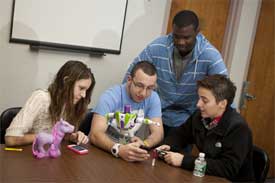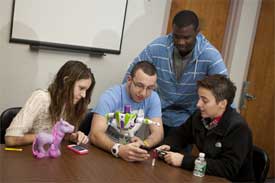 KINGSTON, R.I. – January 23, 2013 – Hazards from exposure to insecticides, mercury, and lead and whether bottled spring water is free of contaminants regularly make headlines around the world.
KINGSTON, R.I. – January 23, 2013 – Hazards from exposure to insecticides, mercury, and lead and whether bottled spring water is free of contaminants regularly make headlines around the world.
But in Angela Slitt’s class, “Toxic or Not?” a University of Rhode Island Grand Challenges offering from last semester, the professor did more than just rely on compelling subject matter to engage her students. She required all of them to Tweet about what they learn and draw others to the Twittersphere to join them in the conversation.
The class satisfies a general education science requirement. Provost Donald H. DeHayes, who wanted freshmen to be stimulated by courses that focus on critical societal issues, launched the Grand Challenges courses two years ago.
Slitt, an assistant professor in the College of Pharmacy, organized the 24 students into eight teams and they competed to be tops in gaining followers and Twitter activity. They had to decide among themselves which Tweets they would send. They also chose their own somewhat foreboding team names, including Team DDT, Team Dioxin and Team Mercury. The students were all non-science majors from every college at URI. The Tweets are fun, informal, a little irreverent and always informative.
Here are a few:
• “If you use Teflon near your bird, be ready to say, ‘Bye, Bye Birdie.’”
• “Chinese workers will risk their lives for hazardous materials in electronics for $8 a day, #astonishing.”
• “Ever thought of mixing bleach and ammonia to really keep the house clean, well DON’T because this will release toxic vapors.”
• “Years after banning DDT and the bald eagle population increasing, Eagle says thank you.”
“We have 168 followers,” Slitt said. “The students get extra credit for high impact followers like the provost, pharmacists, and members of our congressional delegation. Plus, I get to see what students are saying to each other.”
During one part of the course, the students tested Slitt’s children’s toys for lead and Tweeted about what they learned. Some contained lead.
“We talked about why we should be concerned about lead poisoning and what effect it has on learning and development in children,” Slitt said.
She said a study of inmates’ dentin found high levels of lead. “The study revealed that early in life exposures could later have influences on behavior,” the professor said.
“The students learned about a variety of environmental challenges, and they learned how to use the Internet to obtain credible information. The whole point is to get them to think in an evidence-based way.”
As the class wrapped up just before fall semester finals week, Slitt surveyed the students to determine if using social media was an effective teaching and learning tool. The students seemed to think so.
Karly Nash, criminology major from Pawtucket, said until this class she was unaware of how individuals come into contact with chemicals every day. “Exposure to these chemicals makes us so vulnerable,” she said.
Tiffany Gagliardo, a nursing major from Plainsboro, N.J., said exposure to toxins is more than a local problem.
“It’s not just what is happening in our area, but what is happening around the world,” Gagliardo said. “It’s what is happening in places like China, and a big part of it is our impact on others.”
Kyle McLimail, a communication studies major from Pawtucket, said social media is a central part of society now.
“But some of the stuff on Twitter is just stupid,” he said. “This class allows us to learn about new topics, do research on them and then put out helpful Tweets. “Plus, requiring us to post Tweets that would be accurate, we all made sure we read the material beforehand.”
“I hate science,” said Rachel Conboy, a pre-law major from East Hartford, Conn. “But this class is actually very interesting. This class sticks with you.”
Pictured above
NOT TOXIC: Freshmen students in Angela Slitt’s URI class, “Toxic or Not,” examine toys for the presence of lead. None of the toys in the photo had lead in them. From left are: Tiffany Gagliardo, Kyle McIMail, Tyler Hie, and Rachel Conboy. URI Marketing and Communications photo by Joe Giblin.

